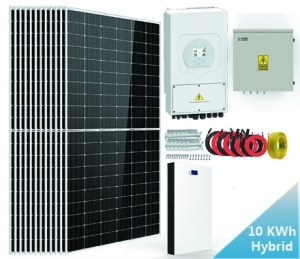In recent years, installing residential solar battery storage systems in their home has become the best choice for many people plagued by the energy crisis. As a devotee of the renewable energy industry, ECE Energy is committed to providing the best home solar energy storage solutions for you to generate electricity from your own solar panels and residential electrical storage systems to meet your home load of electricity. Then use the spare lithium-ion battery to help you get through the night without sunshine. You can also sell electricity to the grid for a return at peak times.
The Role of residential photovoltaic energy storage system in Reducing Carbon Footprint
Solar power is both a practical and effective solution for reducing our carbon footprint .
Decreasing Dependence on Fossil Fuels: By generating electricity from the sun, its the most direct way to reduce the gas emission and create a green world for our human beings.
Reducing Energy-related Emissions: Solar panels produce electricity without any CO2 emissions, which helps in reducing energy-related emissions.
Supporting Energy Efficiency: Solar panels are becoming increasingly efficient, providing more energy output per unit of sunlight, which can offset more fossil fuel-generated energy.
Facilitating Carbon Sequestration: Large-scale solar farms can be integrated with green spaces that absorb CO2, contributing to carbon sequestration.
Promoting Sustainable Development: Solar power promotes sustainable development, leading to low-carbon cities and contributing to climate change mitigation.
The Benefits of Residential Solar Energy Storage Systems
Solar Energy is Abundant
Solar energy is abundant, sunlight is inexhaustible and free. with solar energy storage system, homeowners can greatly reduce their dependence on the traditional power grid .they can generate, store and use their own clean energy, providing greater energy security and control.
Low Maintenance
Low maintenance, less of a hassle, once solar energy storage system settled down, there is an extremely low possibilities to maintenance it. It truly realize the seamless switch from grid to the energy storage system.
Savings on power bills, by storing excess solar energy, residence can use stored energy during peak hours when electricity rates are higher, reducing their reliance on expensive utility power.
Backup Power
solar energy storage system can store the excess energy into the battery to use later or need it the most .
Reduce Their Carbon Footprint
Reduce their carbon footprint and gas emission, since the solar energy is a completely clean energy generated by sunlight, it not only can speed up to achieve zero-carbon emissions but also contribute to a clearner and more sustainable environment.
The Installation Process of Residential Solar Energy Storage Systems
Assess the Feasibility and Necessity of Installing a residential power storage systems in your Home
Before starting the installation process, it is important to assess your energy needs. Start by looking at your past electric bills to estimate your average monthly energy consumption. Collect information on your installation site to ensure that local lighting, radiation, and weather conditions are suitable for installing photovoltaic systems.
Match the Correct System Configuration Scheme
There are various types of solar power storage systems residential on the market, and each system has its own advantages and disadvantages, so it is important to research and choose the system that best suits your requirements. You need technical experts like us to help you customize your own reasonable solution.
Preparations Before Installation
Start by finding a suitable location for your system, such as a garage, basement, or utility room. Make sure the area is well ventilated and away from any flammable materials. In addition to this, electrical upgrades may be required before installing a solar energy storage system. These upgrades ensure systems are safe and efficient, including installing dedicated circuits or hardening the cabling infrastructure.
Install the System
The actual installation of a domestic solar energy storage systems should be done by a licensed professional as it involves electrical connections. The installation of the entire system is divided into the following major blocks: photovoltaic panel installation, battery installation, and inverter connection. We will provide detailed installation instructions.
System Testing/Inspection
Once the installation is complete, a series of tests are conducted to verify the functionality of the system. This includes checking electrical connections, verifying proper communication between components, and testing the battery's ability to charge and discharge.
Precautions
Installing domestic battery power storage systems is a task that requires high expertise. During this process, you must pay attention to the operating manual. It is best to hire experienced professionals to install the system.
FAQs of Residential Solar Energy Storage Systems
QWhat product does ECE ENERGY provide for residential solar energy storage system?
A
ECE energy provide whole domestic solar and battery storage system solution, manufacturing products and ship as a complete set.
QWhat are the components of residential solar energy storage system ?
A
They are 5 key components in a home's solar system, solar panels, solar panel brackets, an inverter,battery storage and other acceossries.
QCan i install the solar energy storage system by myself ?
A
In order to finishe the installation safely and perfectly, We recommend professional installers to do the procedures, its much easier and faster than do it following by manuals every details.
QCan I check my solar energy system status via app ?
A
Yes, you can download an App by phone and check the install capacity, volume capacity per every minute.
QWhat is the difference between grid-tied and off-grid solar systems ?
A
Grid-tied solar systems are connected to the utility grid, allowing excess energy to be fed back to the grid, more importantly, the utility grid can charge your battery at night. on the contrary, off-grid solar systems are not connected to the grid and require batteries for energy storage.
QHow many kWh does it take to power a house ?
A
On average, it shows 30kWh a day in most of the countries, if you want to store more energy as a backup, you can coupled with a bigger battery capacity to install with.
For more information about solar battery off grid system, please feel free to contact us!
Location : No.4,Songbai Rd,Huinan High-Tech industrial park,Huizhou city,Guangdong PR.China., 516001 Guangdong,
Contact : com ECEENERGY, 0086 (0)752 2533906








